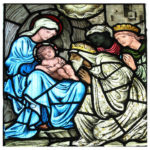We run our website the way we wished the whole internet worked: we provide high quality original content with no ads. We are funded solely by your direct support. Please consider supporting this project.

Love OR Judgment – You Can’t Have Both
Image by Morgan Sessions
We cannot judge others because it is not our place as humans to function as the center—because God is that center—and judge other people. In addition, we cannot judge others because we ourselves are sinners who deserve judgment. If we don’t want to be judged, Jesus says, we must not judge. The measure of the judgment we give is the measure with which we shall be judged.
This is why human judgments are always hypocritical. The act of judging others subjects us to the same judgment we apply to them. The hypocrisy of our judgment is manifested in the fact that it is always selective and self-serving. Because we are trying to fill the vacuum in our spirit with our judgments, we amplify the sins of others while minimizing our own sins.
Jesus teaches the exact opposite (Matt 7). We should consider our own sins to be logs and other people’s sins to be specks. The picture of people with tree trunks sticking out of their eyes looking for dust particles in other people’s eyes is absolutely ludicrous—and that is the point. We are finite, sinful human beings, and as such, we have no business setting ourselves up as the moral police of others, acting as though we know the state of other people’s hearts and concluding that we are in any way superior to them.
While we can discern the impact of behavior, the only conclusion we are allowed to know about a person’s heart is that he or she has infinite worth before God.
In Matthew 7, Jesus is doing nothing less than contrasting two mutually exclusive ways of living. We either live in love, or we live in judgment. The extent to which we do one is the extent to which we do not do the other. If we stand in judgment and do not forgive, we ourselves will be judged and not forgiven (Matt 6:14-15). If we do not show mercy, we will not be given mercy (James 2:13). If we condemn others, we will stand condemned (Luke 6:37).
Conversely, if we die to ourselves as the center and thus die to ourselves as judge, we will receive the life of one who will never be judged. If we accept Christ’s reconciling act and simply have faith that God is who he says he is in Christ, that we are who God says we are in Christ, and that all others are who God says they are in Christ—in other words, if we simply abide in love—then, in fact, all we are is defined in Christ. In Christ there is no judgment (Rom 8:1), for we have entirely opted out of the judgment game created when we lost Paradise.
Recognizing that we can only lose in this game, for we are ourselves sinners, we no longer try to get life by critically evaluating ourselves or others before God. We simply receive, live in, and give the love and mercy of God that has triumphed over judgment.
—Adapted from Repenting of Religion, pages 109-111
Category: General
Tags: Judgment, Living in Love, Love, Repenting of Religion
Topics: Following Jesus
Related Reading

The Greatest Love Story Ever Told
This is the first week of Advent, the season where we anticipate the coming of Christ. It’s a time to hear and enter into the story of how Jesus came out of love to give his life for us. This grand love story of Christmas taps into a deep intuition we have about the centrality…

Why a “Christocentric” View of God is Inadequate: God’s Self-Portrait, Part 5
I’m currently working through a series of blogs that will flesh out the theology of the ReKnew Manifesto, and I’m starting with our picture of God, since it is the foundation of everything else. So far I’ve established that Jesus is the one true portrait of God (See: Part 1, Part 2, Part 3, Part 4).…

Sermon Clip: How Christians Should Respond to Ferguson
In this clip from this weeks sermon, Greg Boyd comments on how Christians should respond to the events in Ferguson St. Louis and how that response should always be in love and to help heal both sides. The full sermon is here: http://whchurch.org/sermons-media/sermon/heart-smart-qa

Possibility of Love
In this video, Greg explores the core sin that stands in the way of love. You might be surprised by what it is. Video by The Work of the People

A Cross-Like Church
When God’s church loves like God loves—which means valuing the other at cost to self—it will puzzle those outside the church. While such love might cause the religious to rail with outrage, it will cause the searching and the hungry to ask, “how can people love like this?” In God’s plan, this puzzle is what…

Is Islam Inherently Violent? – Further Thoughts
Greg originally posted some thoughts on Islam here. In this video, he discusses some responses he received, and further thoughts on a Kingdom posture toward Muslims.
